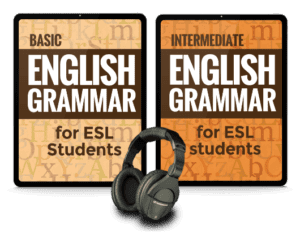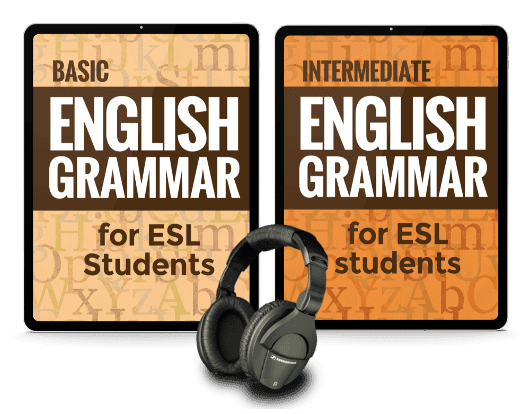
If you’re looking for simple, clear, step-by-step grammar lessons, check out my Basic & Intermediate Grammar E-Books. They’ll teach you essential English grammar so that you can use it confidently without mistakes.
Now let’s look at be, being, and been.
BE
Be is the base form of the verb. We use be after “to.” Here are some verbs in English that are often followed by “to”:
- I hope to be as wise as my father someday.
- She’s learning to be less concerned about other peoples’ opinions.
- You need to be ready to leave by 6:30.
- We’re planning to be in London from the 18th to the 23rd.
- My kids are pretending to be superheroes.
- I promise to be on time for the meeting.
- He said he’d try to be more patient.
- I want to be fluent in English.
- I’d like to be a pilot – it seems like an exciting job.
We can also use be after should, could, would, will, can, and must:
- You should be ashamed.
- This could be interesting.
- I would be happy to help.
- They will be traveling next week.
- This dish can be eaten hot or cold.
- He worked all night; he must be tired.
Notice that after the other verbs, we use “to be”:
- I want to be fluent in English.
But after should, could, would, will, can, and must, we just use “be”:
- I would be happy to help.
BEING
Next we have “being.” This is the continuous form of the verb.
You can use it after:
- am / is / are (present continuous)
- was / were (past continuous)
Check out these examples:
- The food is being prepared right now.
- When I said that dress doesn’t look good on you, I was just being honest.
You can also use being after certain verbs, like avoid, enjoy, can’t stand, don’t mind, look forward to, practice, spend time, and stop. Here are some examples:
- Stop being lazy and help me wash the dishes.
- I enjoy being in a leadership position.
- She can’t stand being lied to.
Always use being (not “be” or “been”) after prepositions:
- I was in the hospital for a month after being in a car accident.
- That’s the problem with being late all the time – people stop trusting you.
- The best part of being a teacher is interacting with the students.
- She got an award for being the best salesperson in the company.
BEEN
Finally, we’ll look at “been.” Notice the pronunciation difference between “BEE-ing” and “been” (which rhymes with win and pin). Repeat after me: being / been
Been is the past participle. Use it after the verbs:
- have/has (present perfect)
- had (past perfect)
For example:
- I’ve been busy lately.
- Have you ever been to London?
- My car has been stolen.
- By the time he showed up, we‘d been waiting for an hour.
Use been after could have, should have, would have, and must have:
- You should have been on time for your job interview.
- The presentation would have been better if we’d done more preparation.
- He could have been injured badly when he fell off his motorcycle; he was lucky he didn’t get hurt.
- Sorry you didn’t get the promotion you were hoping for. You must have been disappointed.
In order to practice using be, being, and been, I suggest going back to the beginning of this video, pausing on each list of examples, and trying to create some of your own example sentences that are similar to the ones I’ve shown you.
Learn more:
To learn more, make sure to get your copy of the Basic & Intermediate Grammar E-Books. Each lesson in the e-books also has a quiz for practice, and they also come with audio for listening practice.


